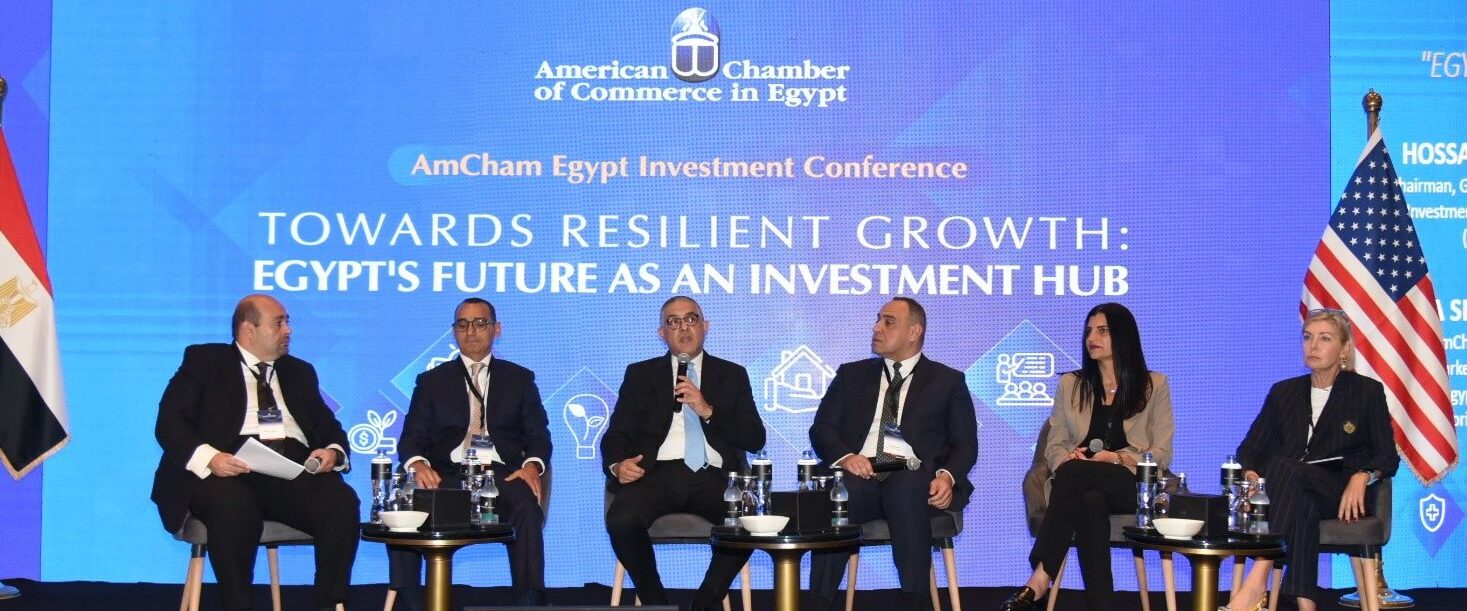The American Chamber of Commerce in Egypt (AmCham Egypt) launched on April 29 its highly anticipated investment conference titled “Towards Resilient Growth: Egypt’s Future as an Investment Hub”, setting the tone for a deep dive into Egypt’s evolving investment climate and the economic reforms shaping its future.
The opening session, Egypt’s Investment Climate and Economic Outlook, brought together key government officials, private sector leaders, and investment experts to assess opportunities, address ongoing challenges, and spotlight Egypt’s recent reform efforts aimed at making the country a regional investment hub.
Egypt’s reform roadmap and investor appeal
Hossam Heiba, CEO of the General Authority for Investment and Free Zones (GAFI), outlined the country’s reform journey, which began 24 months ago. “We started from the promotion side—what Egypt offers as an investment destination and opportunities to investors,” he said.
One of the first major steps, Heiba noted, was the launch of the “investment map,” a comprehensive platform that displays all available investment opportunities across the country in an accessible format for potential investors. GAFI is also focused on digitizing bureaucratic procedures and has already slashed red tape by 33% in an effort to streamline operations.
Heiba highlighted the creation of a dedicated department to consolidate and simplify fee structures. “We found over 300 government bodies charging over 2,000 types of fees,” he explained. “Our target is to give the investor one number representing all fees to be paid to one agency, where they would get all the documents they need to operate.”
He also pointed to tax facilitation measures for small and medium enterprises (SMEs) generating under EGP 20 million annually, as well as broader tax reforms and efforts to improve government interactions with investors.
A major legislative reform was also announced, under which the Industrial Development Authority will become the sole entity responsible for allocating industrial plots—aiming to eliminate duplication and speed up decision-making processes.
“Our ultimate goal is to ensure a level playing field for local investors and foreign direct investment,” Heiba said. “That would be essential, as [the government] is looking to exit the market, leaving the private sector to fuel growth.”
He also emphasized the government’s heavy investment in logistics and transportation, Egypt’s abundance of skilled and unskilled labor, and efforts to shorten import and export clearance times—factors that he said are crucial to enhancing Egypt’s competitiveness.
Investor confidence: Still a work in progress
Despite these reforms, some investors remain cautious. Hossam Abou Moussa, Partner at Apis Partners, compared Egypt to other emerging markets like India and the broader African continent. “Despite opportunities arising from natural and man-made factors, the country can’t capitalize on them,” he noted. “Investors are skeptical about local growth opportunities and uncertainty of what will happen next.”
A measured optimism
Ahmed Shams, Head of Research at EFG Hermes, offered a more optimistic view. “Egypt is moving in the right direction,” he said. “The funding gap is covered until 2026 or 2027. We also deal with cyclical risks, such as high interest rates.”
He highlighted that Egypt’s economic reform program has received full approval from the International Monetary Fund (IMF). “What is left is secondary elements like the government’s exit from the market,” he added.
Shams also pointed out a key driver for attracting more capital: “The key to attracting investors is increasing the private sector’s profit pie, not the distribution of those profits. Capital markets’ depth and liquidity will be critical to investors accessing local opportunities easily.”
The long-term investment perspective
Echoing the need for sustainable reform, Nada Shousha, Vice Chair and Investment Committee Member of the Egyptian-American Enterprise Fund, emphasized: “The ease of doing business in Egypt, incentives, and stable legislation is critical for investors seeking long-term investments.”
Sovereign fund sees strong potential in state sssets
Rounding out the panel, Noha Khalil, CEO of The Sovereign Fund of Egypt, detailed how the fund is working to unlock value across strategic sectors. “The first [focus area] is availing investment opportunities like green hydrogen. The second is real estate developments. The third is maximizing the value of state-owned enterprises,” she explained. “That last point holds the most significant promise for investors.”
The session laid the groundwork for the rest of the AmCham conference, highlighting Egypt’s push toward a more investment-friendly environment while underscoring the work still needed to reassure investors and fully realize the country’s potential as a regional economic hub.




